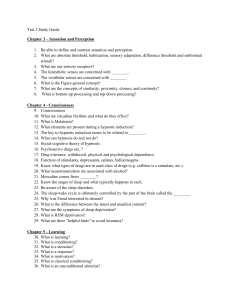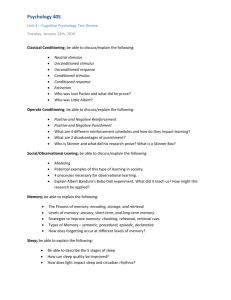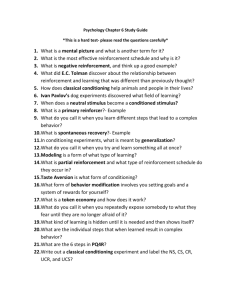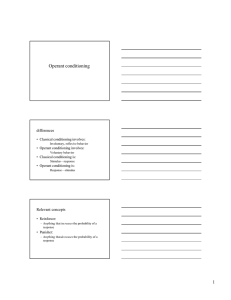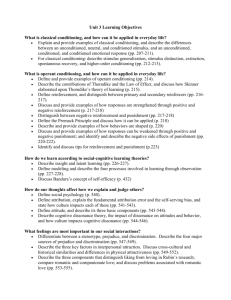LEARNING Behaviorism chapter 7 A change in behavior due to
advertisement
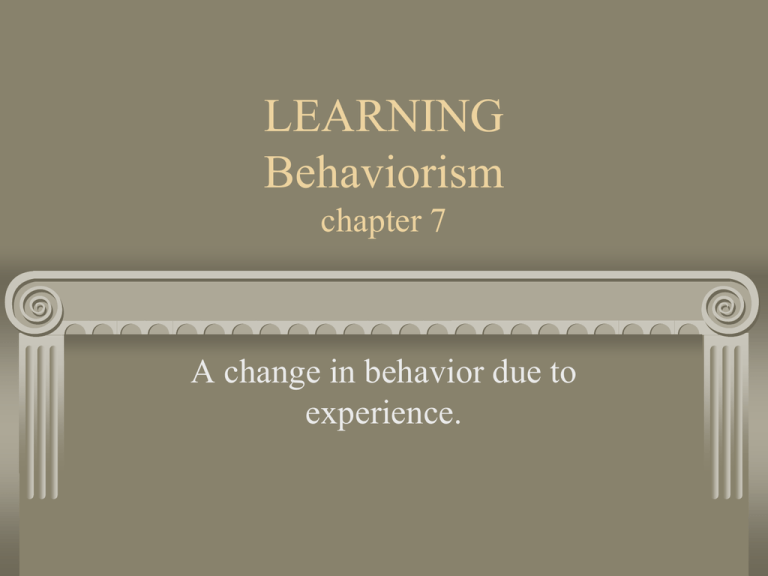
LEARNING Behaviorism chapter 7 A change in behavior due to experience. CLASSICAL CONDITIONING Ivan Pavlov: Russian Scientist Early 1900’s Unconditioned Stimulus UCS A stimulus that leads to a certain response without any previous training. ex. Food Unconditioned Response UCR A response that occurs naturally and automatically when the UCS is presented. Ex. Salivation to food (natural). Neutral Stimulus NS A stimulus that has no effect on the organism. Ex. Bell Conditioned Stimulus CS A neutral stimulus paired with the UCS. Ex. Bell ----Food Conditioned Response CR A learned response. The Office John B. Watson Little Albert Generalization A response spread from one specific stimulus to other stimuli that resemble the original. Ex. White rat –White fur – White beard etc.. Discrimination The ability to respond differently to distinct stimuli. Ex. White fur vs. Black fur Extinction The gradual disappearance of a conditioned response because the CS (bell) is repeatedly presented without the UCS (Food). Aversion Conditioning Phobias and Treatment Aversion Conditioning: (Garcia) Learning to hate what you love. Example “Clockwork Orange” Systematic Desensitization: Slowly deconditioning phobias (baby steps) Flooding/Exposure: Sudden overwhelming exposure to fear (roller coaster) OPERANT CONDITIONING Subject operates on the environment and produces a result that will influence whether he or she will operate in the same way in the future. Shaping B.F. Skinner 1904 – 1990 Walden Two Shaping Skinner Box Behavior Modification Schedules of Reinforcement Behavior Modification B.F. Skinner TERMS TO KNOW + POSITIVE: TO PRESENT (ADD) - NEGATIVE: TO REMOVE (SUBTRACT) REINFORCEMENT = INCREASE BEHAVIOR PUNISHMENT = DECREASE BEHAVIOR POSITIVE REINFORCEMENT GIVE A STIMULIS THAT INCREASES A BEHAVIOR. EXAMPLES: Verbal Praise, Gold Star, High Grade, Attention, Warm Fuzzy NEGATIVE REINFORCEMENT TAKE AWAY AN AVERSIVE STIMULUS CAUSING AN INCREASE IN THE RESPONSE. EXAMPLES: Escape or Avoidance conditioning, Increased freedom or removal of restrictions after grades or appropriate behavior increases. POSITIVE PUNISHMENT Give something bad to DECREASE a behavior. EXAMPLES: A scolding, spanking, shock, lecture from P’s, A “Switch” NEGATIVE PUNISHMENT The removal of a good stimulus, causing a decrease in the response. Examples: Grounded, Not being allowed to watch T.V. or play Games, not having dessert, being suspended from school (supposedly). CHART +R - R GIVE GOOD TAKE BAD +P - P GIVE BAD TAKE GOOD B.F. Skinner Behavior Modification TERMS TO KNOW + POSITIVE: TO PRESENT (ADD) - NEGATIVE: TO REMOVE (SUBTRACT) REINFORCEMENT = INCREASE BEHAVIOR PUNISHMENT = DECREASE BEHAVIOR POSITIVE REINFORCEMENT GIVE A STIMULIS THAT INCREASES A BEHAVIOR. EXAMPLES: Verbal Praise, Gold Star, High Grade, Attention, Warm Fuzzy NEGATIVE REINFORCEMENT TAKE AWAY AN AVERSIVE STIMULUS CAUSING AN INCREASE IN THE RESPONSE. EXAMPLES: Escape or Avoidance conditioning, Increased freedom or removal of restrictions after grades or appropriate behavior increases. POSITIVE PUNISHMENT Give something bad to DECREASE a behavior. EXAMPLES: A scolding, spanking, shock, lecture from P’s, A “Switch” NEGATIVE PUNISHMENT The removal of a good stimulus, causing a decrease in the response. Examples: Grounded, Not being allowed to watch T.V. or play Games, not having dessert, being suspended from school (supposedly). CHART +R - R GIVE GOOD TAKE BAD +P - P GIVE BAD TAKE GOOD Schedules of Reinforcement Ratio = Behavior Interval = Time Schedules Experiment O = attempt X = reward X OOX OOX OOX OOX OOX OOX X OOX OX OOOOOX OOX OOOOX 10 seconds X, 10 Seconds X, 10 seconds X 5 seconds X, 15 seconds X, 15 seconds X, 5 seconds X, (5 20 30 45 50 60) 10 seconds X, 10 seconds X Fixed Ratio Reinforcement depends on a certain amount of behavior being emitted. OOOXOOOXOOOXOOOXOOOX Examples: Subway card, piece work, Commission. Variable Ratio The number of required responses varies around some average rather than being fixed. OXOOOOXXOOOOOOOOOXOOOX Examples: Slot Machine, Sports (Baseball), Most Sales Jobs. FIXED INTERVAL Reinforcement is available at a predetermined time. 10 seconds X, 10 seconds X, 10 seconds X, Examples: School Bells, hourly pay, yearly salary, holidays. VARIABLE INTERVAL The time at which a reinforcer will be available varies around some average rather than being fixed. 3 seconds X, 12 seconds X, 7 seconds X, 25 seconds X. Examples: Weather, earthquakes, phone calls. Graph of Schedules STORY Concepts of Learning Primary Reinforcer = natural reinforcer. Conditioned Reinforcer=Signal for a reinforcer or punisher. Feedback Necessary for learning. Finding out the results of an action or performance. Transfer Positive Transfer A previous learned response helps you to learn a new task. Negative Transfer A previously learned task hinders learning. Practice The repetition of a task helps to bind responses together. zyxwvutsrqponmlkjihgfedcba Learned Helplessness Seligman Numerous experiences in which actions have no effect on your world. Learned Depression Learned Laziness Chaining Responses that follow one another in a sequence are put together. Swimming, Bowling Social Learning All learning in a social situation. Albert Bandura “a more complex explanation for behavior is needed.” Observational Learning Imitation – Parent to child. (Speech patterns, personal habits) How you react to others. Modeling Behavior of others increases the chance that we will do the same thing. (Social situations) Disinhibition Threatening activity.

